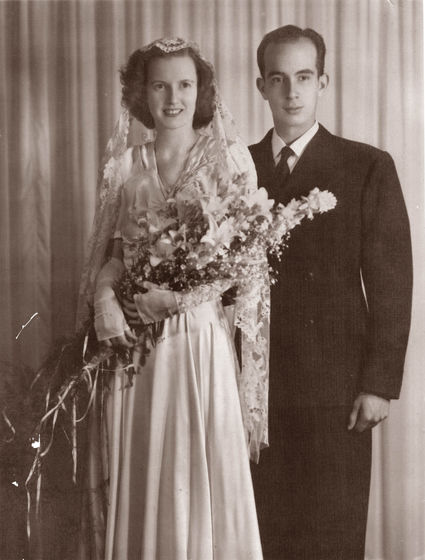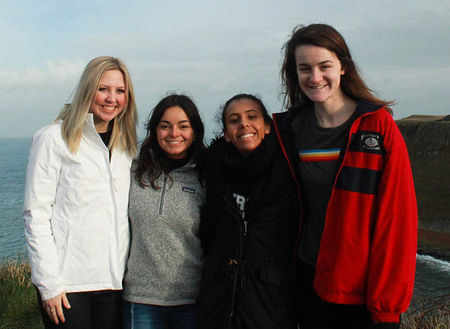The O’Connells, COVID, and computer apps: How a study abroad student made the most of her time in Ireland

At age ten, Irene Valdes Salazar’s aunt brought her a souvenir from a recent trip to Dublin, Ireland.
“Look, there’s a street named after our family!” she remembers saying.
She remembers putting the O’Connell Street fridge magnet up, finding it amusing, but not thinking too deeply about it at the time. Age ten was a time for watching the Disney channel after a long day of multiplication tables, not genealogy research. To her, O’Connell was simply an appendage to the Valdes surname, styled in the usual Hispanic and Latinx way: the father’s last name followed by the mother’s maiden name.
The O’Connells
For Valdes, the O’Connell name did not carry with it the weight of a nation, of an entire people’s struggle for emancipation. It was not the same O’Connell as the Daniel O’Connell— “The Liberator,” “The Emancipator”—of which the O’Connell Streets, O’Connell Bridges, and O’Connell statues of the world, and Notre Dame’s O’Connell House, find their namesake.
Born and raised in Guatemala, Valdes knew little about her Irish heritage beyond the O’Connell name, more specifically her great-grandmother’s name: Patricia Joan O’Connell. Patricia was the daughter of Irish immigrants who met and married in New York City. They were hoping for a boy and planned to name him Patrick John, calling him PJ, a very popular moniker for Irish and Irish-American babies of the time. The revelation that their baby was a girl derailed that plan only slightly, as Patricia Joan could still be shortened to PJ.
 Valdes Salazar’s great grandmother Patricia O’Connell and my great grandfather Jose María Valdés, on the day of their wedding.
Valdes Salazar’s great grandmother Patricia O’Connell and my great grandfather Jose María Valdés, on the day of their wedding.In South America, Valdes’s great-grandfather, Jose María Valdes, prepared to leave Guatemala to attend a university in Wisconsin. On a trip to New York for the World Fair, he met Patricia and the rest was history (though a history rarely discussed in Valdes’s memory).
The pair were married in the Mexico, in the midst of World War II, with almost no one in attendance at their wedding. Patricia soon relocated to Guatemala where she would raise the Valdes O’Connell family, and where she would remain for the rest of her life, despite her “refusal to learn Spanish,” as Valdes was often told.
As for the rest of the details—about her great-great-grandparents who emigrated from Ireland, about her great-grandmother’s brothers and sisters in the United States, and even about her great-grandmother’s life before Guatemala—Valdes knew very little. Her great-grandmother Patricia was a very private woman and rarely spoke of her Irish-American family; Valdes speculates, “maybe it made her too sad,” knowing she might never see them again. She remembers her great-grandmother’s story feeling like a big secret when she asked questions of her father and grandfather. It was not until Valdes told her family that she had decided to study abroad in Dublin, Ireland—more influenced by Dublin City University’s computer science classes than interest in her Irish roots—that her grandfather, Jose Fernando Valdes O’Connell, showed her his DNA test reporting 49% Irish ancestry.
“I was amazed,” she remembers, “I just didn’t realize how much Irish we had in us, all the way in Guatemala.”
Valdes was a part of the largest study abroad cohort the Dublin Global Gateway has hosted in its 22 years of operation in Ireland, as well as a part of only the second cohort of students to attend Dublin City University, a new study abroad program established in the Spring of 2019.
The eleven students in the DCU cohort, a mix of computer science, business, and entrepreneurship majors, grew very close over a fulfilling, albeit truncated, study abroad experience in Dublin.
COVID-19 outbreak
Midway through the semester, on March 13, the University announced the suspension of all study abroad programs due the COVID-19 outbreak. Valdes and her classmates at DCU were among the 450 Notre Dame students to return to the United States immediately before border closures went into effect. While the news was shocking at the time, Valdes, now six weeks into lockdown, has a sense of humor about her unorthodox study abroad experience.
“Maybe we were having too much fun,” she muses. “We had enough fun in two months for the whole semester. Something had to send us all home.”
After a week at home in Guatemala City, Valdes and a few other DCU students felt an overwhelming urge to help the COVID-19 relief effort in some way. It started with some simple questions they had: “What businesses are even open near me right now? How do I support small businesses in my community if I do not know where, or even how, I can spend money?”
Computer apps
While there are a plethora of apps supporting restaurants during the global lockdown (UberEats, GrubHub, Postmates, Deliveroo, JustEat, DoorDash, InstaCart, Caviar, Jumia, and many more), the group saw a space to connect individuals to local businesses in other sectors like art, retail, or nonprofit. This group of Dublin Domers aims to create a searchable, global database for local businesses and organizations to advertise exactly how they are adapting during this existence-threatening time. Their database will be especially useful to businesses who rely on foot traffic, window shopping, and casual browsing—modes of commerce made all but impossible under current restrictions—to bring awareness and revenue. The website will be of benefit to smaller restaurants as well, particularly to those that offer their own delivery or take-out services and might not be able to afford to be listed on popular apps.

The group of students working on the project are as impressive and as diverse as their goals, with five majors, six minors, four languages, and three citizenships to claim between them. Hind Zahour, Irene Valdes Salazar, TJ Dasso, Christian Amstutz, and Haley Holden—with academic backgrounds in computer science, technology, and entrepreneurship—have joined forces to create this database they are calling HITCH, not just an acronym of their first names, but an apt word to describe their goal of connecting individuals to their communities in a safe, mutually beneficial way during this crisis. HITCH is currently in the early stages of development. Amstutz and Dasso have been working on the backend of the database, focusing on the website server and ensuring there is no data corruption. Valdes and Zahour have taken over the frontend: concept, website design, and eventually, marketing. Because HITCH is a more straightforward database concept, they imagine the website will work for communities on a global scale, and they already have the tools to market it as such. The pair can fluently speak English, Spanish, French, and Arabic and have experience living and working in the United States, Guatemala, Morocco, South Africa, Tanzania, and now Ireland as well. Holden plays a key role in the middle, being a member of both the front-end and back-end teams as they build the bones of the website and database to ensure the components interact in the way they should. The group will continue to work on HITCH as they complete their classes online at DCU and hope to roll out the website for businesses and organizations in their localities soon.
HITCH is not the only project Valdes has planned for the summer. After spending months in Ireland, she is excited to delve into her O’Connell ancestry. Her grandfather Jose Fernando has already started research of his own, finding his grandparents’ Ellis Island immigration records; though he is still looking for their Irish birth certificates to uncover where exactly the (Valdes) O’Connells emigrated from in Ireland. Valdes and her grandfather recently learned that Patricia’s brother was called Danny—short for Daniel O’Connell—and was responsible for liberating a concentration camp in Nazi Germany while enlisted in the U.S. Air Force. Valdes has already joined in her grandfather’s search and plans to contribute more this summer in addition to the HITCH project, especially if her internship with Apple in Cupertino, California is postponed due to COVID-19, as many internship experiences may be this summer.
While Valdes does not know if her Irish heritage will connect the Valdes O’Connell family to the O’Connells of Derrynane, County Kerry, she now understands the importance of the name, not just in Ireland, but globally. How could she not after Kevin Whelan’s “Introduction to Ireland” history class? Though her study abroad experience did not go as she had imagined, she is happy to have spent two months in Ireland, happy to have made great friends at DCU who share her passion, and especially happy to have called what might be her great-great-great-great (-great?) grandfather’s house, Notre Dame’s O’Connell House, home for the spring of 2020.
Learn more about study abroad opportunities in Dublin.
Originally published by at dublin.nd.edu on May 18, 2020.